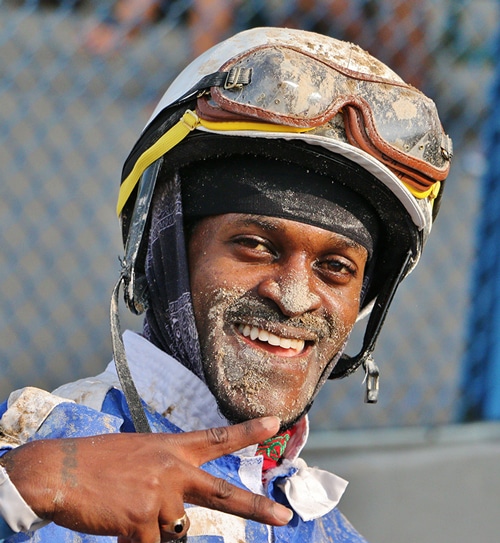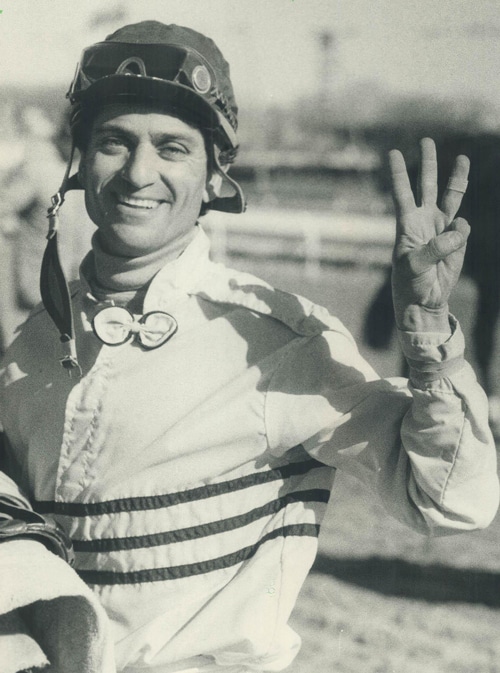“Overall, we are failing. For jockeys, they ride say 10 races and they lose every one and they can go weeks or months. I’ve gone months without riding a winner, and that means I’m struggling in every aspect. No one in the room is asking if you need help, it’s kind of ‘grow up, that’s part of business, if you can’t handle it, get out.’”
Declan Carroll is sitting across the table in the conference area behind the jockey’s room at Woodbine Racetrack. The 23-year-old moved his tack to Woodbine last year. Despite being new to the colony, Carroll isn’t afraid to voice his opinion on the need for mental health support and the struggles he’s faced within his career.

Declan Carroll.
While jockey’s mental health is not a new topic of discussion, the deaths of US jockeys Avery Whisman and Alex Canchari earlier this year have brought the topic into sharper focus more recently within the sport of kings. Whisman passed away on January 11 at the age of 23. Canchari, took his life on March 1; he was 29.
Carroll knew Whisman, and the news of his passing hit him hard.
“That really shocked me. He was happy as can be, enjoying life, he just got engaged and then you find out he just killed himself. That was a really big eye-opener. Alex Canchari, he unfortunately took his life not too long ago. There are so many jockeys that are dealing with such pain, mentally and physically, what we go through, the stresses,” said Carroll.
The stresses of race riding can take many forms, including moving to a new track. “Adjusting to the colony and everyone, you are the new guy. You can either be looked at as ‘let’s help the new guy’ or ‘let’s try to push him out.’ Luckily, I’ve had some very good friends here that have helped me. People are very welcoming to me. But you also get the people who want to push you out. As soon as you walk in the door, you hear things about yourself and you haven’t even met the person yet – so that was a big adjustment,” said Carroll.
Currently there are over 50 jockeys calling Woodbine home. With just two thoroughbred tracks in the province, there are fewer pieces of the pie to be shared by each jockey. Not surprisingly, financial stability – or instability – is another factor affecting their mental well-being.
“Unless you are winning, you are not making money. If you are not making money, you can’t be financially stable. And when you are not winning, you are not happy; you go down a long road of why I couldn’t do this, why couldn’t I ride a horse that way, and mentally everything gets much more stressful. Luckily [I’m off] off to a good start, but there are going to be bad days, as there always are.”
From the perspective of bettors and racing fans, the athleticism of each jockey is on display each time they ride. But beyond the silks, the tough exterior and bravado, jockeys are fighting their own battles far from the public eye. One rider that knows that all too well is Justin Stein.
Stein has been riding for over 15 years in Canada and readily admits that he’s struggled to stay mentally strong in the past. “I felt like an actor, coming to work, putting on a brave face, and doing the best job I could. I love my job. I couldn’t understand why I was so unhappy,” said Stein.

Jennifer and Justin Stein.
He does not shy away from the tough questions concerning mental illness. “I can definitely say that I thought about killing myself a lot. People know that. I’ve spoken about it before, but people didn’t care to listen.” He credits awareness of the issue, “because knowledge is power and strength – and that’s how you defeat a sickness like that. It was a temporary moment, it’s a moment in my life that’s gone, but when you look inside your mind and it’s just darkness, hopelessness. I was frustrated with myself – unhappy, not being able to get out of bed in the morning, chronic pain … its really defeating,” said Stein.
Stein has ridden in more than 10,000 races during his career and won over 1,300 of them. The veteran rider has won multiple graded stakes races and secured the 2012 Queen’s Plate aboard Strait of Dover. Back in 2016, at the age of 36, Stein retired from racing. However, in 2019 he returned to the irons with a more positive mindset.
“I developed an attitude that I like to call just being an ‘ass kicker.’ Just have to flip the switch, I took all the negative stuff and turned it into the flipside and decided to focus on the positive.”
Stein attributes staying on track due to a change in mindset and lifestyle. “I try to find a balance and harmony in life because being a jock is such an exhilarating job. When you win, the highs are higher than high, but that goes away just like that overnight. I take the dogs for a walk with my wife [Jennifer]. We walk five k a day. We keep it pretty simple. We prioritize our evenings not just towards ourselves but more towards our boy, Benjamin. That leaves me with a feeling of fulfillment. It takes work, and it takes effort, but it’s worth it because in the end, and you know you’ve done the right thing.”
Building yourself to be mentally strong can look different for every jockey. Carroll has developed a specific exercise regime to support his mental health.
“I get up at three a.m. every morning. That’s not common for many people at all. I set that standard for myself about three to four months ago. I go to the gym, I work out, its starts me off on a great day. I’m happy, I feel good. I go work horses in the morning, and luckily business is good, knock on wood. You are going to have your bad days, but at least I know I set myself up for a good day whether I leave here with a winner or without one, I know I’m the fittest I can be – the fittest I’ve ever been.”

Christopher Husbands. (JockeysCanada photo)
Barbadian jockey Christopher Husbands, the leading rider at Fort Erie last year, notes there are a couple of things that keep him mentally fit.
“I find what works for me – I play a lot of music, and I call my dad or my mom, not just someone to talk to, but someone who gets you, that you connect with that understands you,” said Husbands.
Having someone to confide in is important, but jockeys, unlike other professional athletes, do not have access to a doctor or sports psychologist each time they get to the jock’s room on a race day. This is a stark contrast to other athletes like hockey players who have access to professional help through an assistance program. The NHLPA, a collective bargaining representative for NHL players, designed a long-standing assistance program to support players struggling with mental health or substance abuse issues. Through the program, players can access a counsellor or call a confidential hotline. Moreover, players that enter the program will be paid while they are away from the rink.
In horse racing, the Jockeys’ Benefit Association of Canada (JBAC) represents approximately 150 riders across Canada. The association assists jockeys applying for work in the country, negotiates insurance claims, addresses safety issues, and provides counselling for jockeys with “personal or physical issues.”
Given the media attention surrounding mental illness, Daren Gomez, the executive director of JBAC, acknowledges the association is working to improve mental health support for jockeys and has coordinated its efforts with the Horsemen’s Benevolent and Protection Association (HBPA) in Ontario.
“In Ontario, we made a deal with Sue Leslie, the president of the HBPA, where we can access their EAP (Employee Assistance Program). If jockeys are under stress, not eating right or have problems, they can phone that hotline and it’s completely confidential,” said Gomez.
While jockeys work out of Woodbine, they are not employees of the track and therefore do not have access to Woodbine’s employee assistance program. However, Gomez doesn’t rule out the possibility of the track operator helping out jocks in the future.
“We don’t get paid by Woodbine, we get paid by the owners of the HBPA that hire us, so there’s a lot of red tape for them to get involved, but they are very willing to.”
Supporting the mental health of jockeys across the country has also been tricky due in large part to insurance matters. “I’m still working on a program to get to the Western Canada jockeys but it’s extremely difficult because unless you have upwards of 1,000 employees, insurance is extremely expensive,” said Gomez, who travels from track to track across Canada, tackling issues such as negotiating riding fees, making sure insurance programs are in place, and generally being a receptive ear for riders when they need it.
“I’m always available, but some people because of the industry being so competitive are afraid to show weakness, because someone is going to take their food, their horses to ride. I’m a good choice for somebody who might be a friend or who trusts me; some people don’t want anybody to know.”
To put it bluntly, jockeys don’t want to talk about their mental health for fear of being perceived as weak. That stigma remains deeply ingrained within the fabric of the racing community. Carroll has only been riding at Woodbine for a short period, but he doesn’t mince words when it comes negative perception others may have of riders suffering from mental illness.
“You have to be very careful on the racetrack who you tell your stuff to, because it gets spread around. Fortunately for me, I’m in a good place, but fifty per cent of people aren’t. They are going through struggles and they can’t tell someone because they are afraid they are going to tell someone else, and somebody will have the perception, ‘well, he is not mentally right, he is not on the right path, why would I put him on a horse?’” said Carroll.
Gomez acknowledges the stigma persists throughout the colony.
“We want to help people, but [it’s tough to get] that other person to reach out because there is still that stigma. In Ontario, and there are upwards of fifty jockeys between Woodbine and Fort Erie. The average field size is over eight, and Woodbine runs almost eight months a year, but the other tracks don’t, so it’s a lot of competition for a little money. But it’s like any game in the world – the top five guys make a very good living.”
Another issue that negatively impacts a jockey’s mental health is the seasonal nature of the sport in Canada. Jockeys ride at Woodbine from April to December, and some will opt to take the winter off, while others move their tack to other tracks in the US or abroad. It’s a fine balancing act between earning money for yourself (and your family in many cases) while also taking time to recharge and rest for the following racing season.

Larry Attard. (Jeff Goode / Toronto Star archives)
Retired jockey Larry Attard rode for 24 years at Woodbine and is keenly aware of the balancing act jockeys must perform throughout their riding careers.
“The jockeys worry for tomorrow and next week, and the week after. They want to keep riding eight or nine months. They get three months off, but if they’ve got a family, how are they going to support it? But you have to take some time off to support yourself and your mind and body will be healthy,” said Attard.
Social media is another stressor that jockeys have to contend with outside the racing bubble. While freedom of speech is one thing, the growing barrage of insults and derogatory comments across social media can impact a jockey’s state of mind. Carroll tries not to fall victim to the negative social media loop. “If you work to please people on social media, you are already losing.”
The recent losses of several young riders in the US has sparked some initiatives. In March, the Jockeys’ Guild and the Horse Racing Integrity and Safety Association (HISA) announced they would work together to address jockey’s mental wellness. On April 25, the Jockeys’ Guild distributed an anonymous survey to jockeys to evaluate their mental wellness needs. On May 23, HISA announced several findings from that survey, which had 230 respondents. It found that “a third of those surveyed have had challenges in their daily lives over the past month due to feelings of sadness, depression, or anxiety.” The survey also found that 93% of respondents were concerned “about financial stability and providing for their families.”
While the survey findings are a step forward, some countries have made more progress than others in providing mental health support for jockeys.
“They have the Oaksey House in England. They have doctors, they have physical therapists, they have gyms for jockeys to go into every day. Someone to speak to, whatever you want to talk about. We don’t have that Canada or in the US. You can go talk to a therapist, a sports psychologist, which are amazing for us. We pay for them for ourselves, though. The track doesn’t offer that, at least to my knowledge,” said Carroll.
As the racing season continues to unfold at Woodbine and recently commenced at Fort Erie, the industry needs to find a solution to support the long-term mental health and well-being of the riders in the province. The conversation has started, and while some support is in place, the current system does not prevent riders from falling through the cracks. Hopefully someone will step up and provide another important piece of the puzzle.


